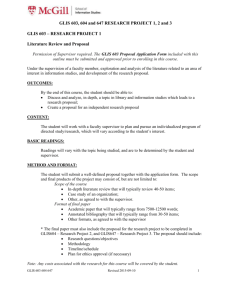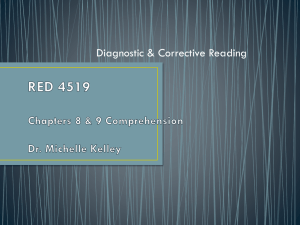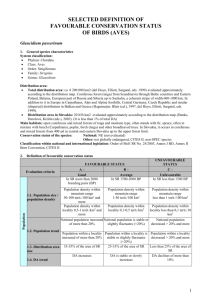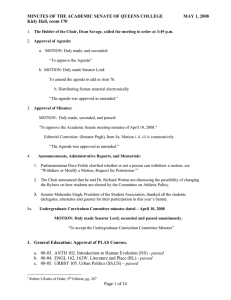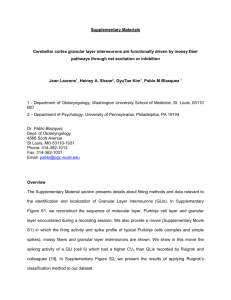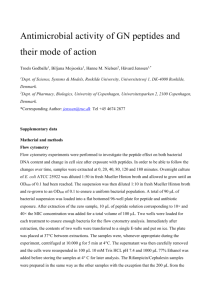Individuals enrolled in the certificate program
advertisement
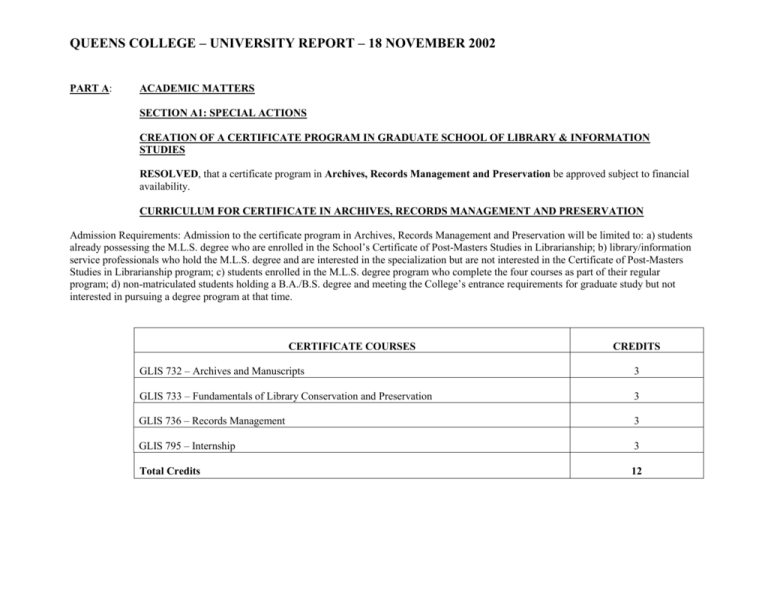
QUEENS COLLEGE – UNIVERSITY REPORT – 18 NOVEMBER 2002 PART A: ACADEMIC MATTERS SECTION A1: SPECIAL ACTIONS CREATION OF A CERTIFICATE PROGRAM IN GRADUATE SCHOOL OF LIBRARY & INFORMATION STUDIES RESOLVED, that a certificate program in Archives, Records Management and Preservation be approved subject to financial availability. CURRICULUM FOR CERTIFICATE IN ARCHIVES, RECORDS MANAGEMENT AND PRESERVATION Admission Requirements: Admission to the certificate program in Archives, Records Management and Preservation will be limited to: a) students already possessing the M.L.S. degree who are enrolled in the School’s Certificate of Post-Masters Studies in Librarianship; b) library/information service professionals who hold the M.L.S. degree and are interested in the specialization but are not interested in the Certificate of Post-Masters Studies in Librarianship program; c) students enrolled in the M.L.S. degree program who complete the four courses as part of their regular program; d) non-matriculated students holding a B.A./B.S. degree and meeting the College’s entrance requirements for graduate study but not interested in pursuing a degree program at that time. CERTIFICATE COURSES CREDITS GLIS 732 – Archives and Manuscripts 3 GLIS 733 – Fundamentals of Library Conservation and Preservation 3 GLIS 736 – Records Management 3 GLIS 795 – Internship 3 Total Credits 12 QUEENS COLLEGE – UNIVERSITY REPORT – 18 NOVEMBER 2002 The internship is to be conducted in an appropriate setting, such as an institutional archive or a preservation/conservation department that must be approved by the GSLIS. (This component is required in all Society of American Archivists programs.) Individuals enrolled in the certificate program, library/information service professionals already holding the M.L.S. degree, current M.L.S. degree students and non-matriculated students who have already completed one or more of these courses may select from the menu of four elective courses listed below to obtain the certificate. Internship (GLIS 795) is required of all students seeking this certificate. ELECTIVE COURSES CREDITS GLIS 705 – Organization and Management 3 GLIS 729 – Introduction to Metadata for Cataloging and Classification of Electronic Resources 3 GLIS 731 – Development of Books and Printing 3 GLIS 735 – Digital Libraries 3 Background / Foundation: For many years the GSLIS has been offering courses in the following areas: Archives and Manuscripts, Records Management and the Preservation and Conservation of Library Materials. With the completion of the New Media Lab expected in the 2002/2003 academic year, the GSLIS will be able to broaden its offerings in this general area by adding courses in digital imaging and preservation, both burgeoning areas of interest. The concept of a certificate program in this specialization was introduced to the GSLIS Advisory Council on February 20, 2002. It was very well received at that meeting. Additionally, the GSLIS has examined the Society of American Archivist’s Guidelines for a Graduate program in Archival Studies and the detailed offerings of the 17 schools listed in its Directory of Archival Education. This research resulted in the identification of competencies students in this area should attain. These include: • Background/Foundation ◊ Know the basis for the creation of archives and collections of agency records and the uses to which both types of collections are put. (GLIS 732, GLIS 733) QUEENS COLLEGE – UNIVERSITY REPORT – 18 NOVEMBER 2002 ◊ ◊ ◊ Understand the administrative, legal, economic and allied contexts for archives and collections of records. (GLIS 732, GLIS 736) Be able to identify, authenticate and acquire records and allied materials important to the host institution (GLIS 732, GLIS 733, GLIS 736) Be aware of the ethics and values of archivists and records managers by being familiar with the Society of American Archivists’ Code of Ethics (GLIS 732, GLIS 736) • Preservation/Conservation ◊ Be able to identify the possible causes of deterioration of records in all formats. (GLIS 733, GLIS 795) ◊ Be familiar with the current methods for the conservation of materials in archives and collections of records. (GLIS 733, GLIS 795) ◊ Know the steps to be taken to prevent and/or retard the deterioration of print materials. (GLIS 733, GLIS 795) ◊ Determine the appropriate technological strategy to employ in maintaining an archive or collection of institutional records. (GLIS 733, GLIS 736, GLIS 795) • Administration ◊ Understand the basic principles of managing an information-based organization. (GLIS 732, GLIS 733) ◊ Be able to plan the physical setting for such organizations to ensure that the proper facilities and equipment are available (GLIS 733, GLIS 795) ◊ Have the ability to plan programs and satisfy the information needs of various user groups in order to improve the archive/records center’s visibility within the host institution. (GLIS 732, GLIS 733) ◊ Know budgeting techniques and grantsmanship in order to provide a sound fiscal base for the archive/records center. (GLIS 732, GLIS 733) • Organization/Access ◊ Be aware of current standards for providing both physical and intellectual access to records and archives (GLIS 732, GLIS 736, GLIS 795) ◊ Understand descriptive tools employed by archivists and records managers to achieve bibliographic control and provide access to individual documents within an archive or collection of records. (GLIS 732, GLIS 736, GLIS 795) ◊ Be able to apply these same principles to provide both bibliographic control and access to archives and records in digital form (GLIS 732, GLIS 736, GLIS 795) • Professional Development ◊ Obtain professional experience by working as an intern in an archive or records collection under the direct supervision of a library/information service professional in this specialty. (GLIS 795) ◊ Know where and how to access information for further professional development. (GLIS 732, GLIS 733, GLIS 736, GLIS 795) ◊ Learn how to interact with both colleagues and other library/information service professionals in the host institution. (GLIS 795) QUEENS COLLEGE – UNIVERSITY REPORT – 18 NOVEMBER 2002 ◊ Participate in the activities of professional associations, enroll in in-service and other forms of continuing education and continuously monitor the professional literature in this specialty. (GLIS 732, GLIS 733, GLIS 736, GLIS 795) The certificate will be awarded to all students maintaining a 3.0 GPA in the courses in the certificate program. Students beginning this certificate program as non-matriculants must apply for and receive matriculated status in order to continue beyond six credits. Only matriculated students at the completion of the program can obtain the certificate. Relationship To Existing Programs At The College: The GSLIS is not aware of any similar effort on the part of any department at the College. Projected Enrollment: Excluding students enrolled in the M.L.S. program itself, it is anticipated that this program could attract 10-15 students per year. Impact On The College: These courses are already in the GSLIS curriculum so there is no need for course development. All of these courses are already being taught on a regular basis. There is no need for additional resources at this time. EXPLANATION: The GSLIS proposes this certificate program in Archives, Records Management and Preservation as one that will provide a service to aspiring professionals in the discipline. The Director and the Chair of the School’s Curriculum and Syllabi Committee began meeting with faculty with expertise in the pertinent areas in the Fall of 1999. More recently these meetings have added Ms. Peggy Schein, Curator of the Louis Armstrong Archives at Queens College and Dr. Jon Peterson, Graduate Advisor of the History Department at the College. Dr. Peterson supports this proposal since recent state legislation has created a program for archiving local historical records. He believes that graduate students in history, the social sciences and education will be attracted to this new offering also.
